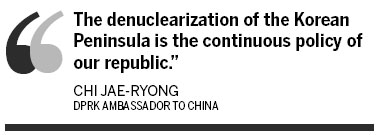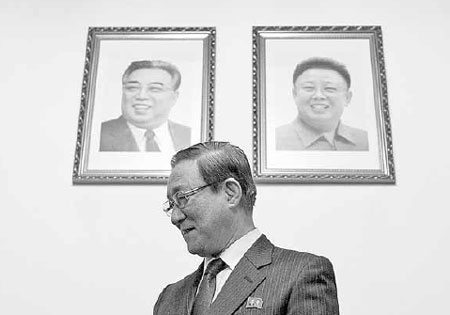DPRK agrees to resume talks
Pyongyang offers olive branch while Washington says 'action' not seen
The Democratic People's Republic of Korea's ambassador to China said on Jan 29 that the DPRK has agreed to resume the Six-Party Talks and has called on the United States to fulfill its obligations.
Chi Jae-ryong made the remarks at a news briefing, at which he reiterated the DPRK's recent peace call.
He said the DPRK has already "taken a seat on the boat of the talks" and urged the Republic of Korea, the US, China, Japan and Russia to revive negotiations.
"The denuclearization of the Korean Peninsula is the continuous policy of our republic," he said.
The ambassador said the DPRK's willingness to resume talks does not mean it should unilaterally abandon nuclear weapons. As long as the nuclear threat continues, he added, the DPRK has to strengthen its nuclear program.
"As long as the anti-DPRK policy of the US continues, we cannot expect any resolution of the nuclear issue," said the ambassador.
The Six-Party Talks, first launched in Beijing in August 2003, produced the historic Sept 19 Joint Statement two years later in which the DPRK pledged to abandon all of its nuclear weapons and existing nuclear programs in return for energy aid and security guarantees.
Since the 2005 deal, Pyongyang has broken from its pledge with three nuclear tests. The negotiations, aimed at dismantling the DPRK's nuclear weapons program, have been halted since late 2008. Chi said the Sept 19 Joint Statement was not honored by the DPRK because the US evaded its promises and obligations.
The DPRK's National Defense Commission said in a three-point "important proposal" on Jan 16 that inter-Korean relations could thaw if the two sides make efforts to implement a proposal by the DPRK that calls for the verbal and military provocations between the two nations to cease. It also called for practical measures to prevent a "nuclear disaster" and for the implementation of its proposal to begin on Jan 30.
Meanwhile, Glyn Davies, US special representative for the DPRK, said he has not seen any change in attitude from Pyongyang about resuming the Six-Party Talks. He made his remarks in Seoul after meeting with his ROK counterpart Cho Tae-yong, who represents the ROK at the multilateral dialogue.
The US diplomat told reporters that the US and its allies are looking for "sincerity and actions" from Pyongyang, adding that the DPRK understands the requirements outlined in the Sept 19 Joint Statement.
Cho said the DPRK leadership should clearly recognize that no strategic interest would be earned with its nuclear weapons program, confirming that the annual military drills between Seoul and Washington will be held as scheduled because the joint exercise is defensive in nature.
Seoul and Washington are set to conduct their annual military drills from late February to April, which Pyongyang has denounced as a rehearsal for a northward invasion.
On Jan 27, the DPRK called for the ROK to cancel its firing drills near the disputed western sea border. Seoul carried out the exercise as planned on Jan 28.
Recently, the DPRK and the ROK agreed to hold a reunion of families separated by the 1950-53 Korean War. They have yet to hammer out details for the reunion, such as dates and preparations.
Before his arrival, Davies held talks in Beijing with Chinese officials, including his Chinese counterpart Wu Dawei. He was scheduled to fly to Japan on the morning of Jan 30.
|
Under the portraits of the late Democratic People's Republic of Korea's leaders, Kim Il-sung (left) and Kim Jong-il, DPRK Ambassador to China Chi Jae-ryong stands up to leave after a news conference at the DPRK embassy in Beijing, on Jan 29. Alexander F. Yuan / Associated Press |

(China Daily 01/30/2014 page11)



















